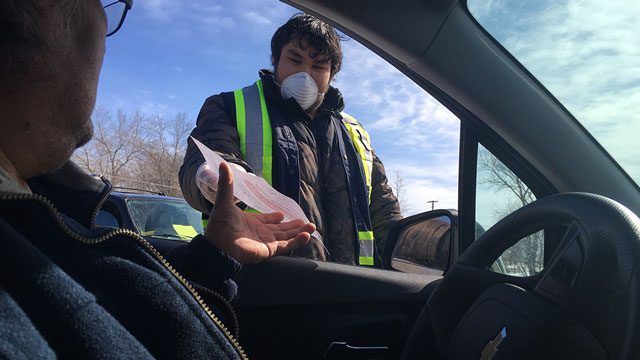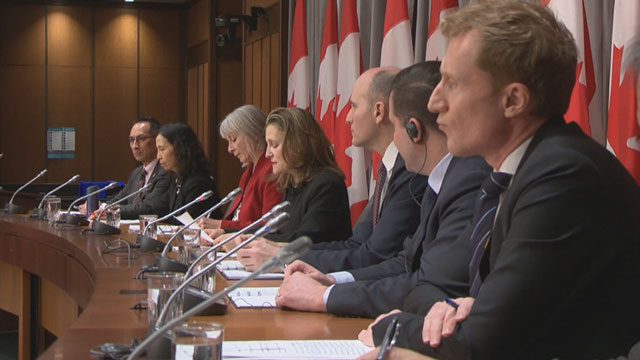
A remote fly-in First Nation in northern Ontario is locking down borders and restricting air travel in and out of the community to prepare for COVID-19 while the government is setting up a task group to help remote and isolated communities.
Chief Bruce Achneepineskum said “everything is heightened” right now in Marten Falls, an Anishinaabe community on the Albany River roughly 450-kilometres north of Thunder Bay.
“We’re going to lock down pretty soon also. We’ve already started to. With the assistance of airlines, we’ve been shutting down air services into the community with the hopes of limiting exposure to any potential COVID infections,” he said.
But outsiders are still coming in. Essential infrastructure needs maintenance. Goods have to be delivered.
The community is served by a nursing station staffed by one and sometimes two nurses. To get to the nearest hospital you have to fly 40 minutes to the town of Nakina then drive 40 minutes to Geraldton. Normally people get medevac’d to Geraldton or Thunder Bay.
It’s tough to get critical items like masks, gloves and sanitizing solutions because of that isolation.
A province-wide state of emergency and a local lock-down hasn’t made that easier.
“We’re isolating ourselves even further right now in the community. With that there’s potential situations that we can encounter, maybe, in terms of policing and medical support and also meeting the basic needs of the people,” he said.
“We’re very ill-equipped in our community to deal with it.”

(Valerie Gideon, centre, discusses the government’s plan to combat COVID-19 in Indigenous communities. Photo: APTN)
Remote and Isolated Settings Task Group
During a virtual town hall on Wednesday in Ottawa, the federal government said a special task force was in the works for communities like Marten Falls.
“We have also been able to champion the establishment of a specific technical working group for remote and northern community issues,” said Valerie Gideon, senior assistant deputy minister at First Nations and Inuit Health Branch (FNIHB) at Indigenous Services.
This group is called the Remote and Isolated Settings Task Group. Stephen Harper’s Conservative government employed a similar task force during the 2009 H1N1 pandemic.
On Thursday, Minister of Indigenous Services Marc Miller confirmed the task group is part of the government’s plan to help remote communities. He added that this strategy includes addressing concerns like Achneepineskum’s.
“As part of the allocations and the planning that we’re making, that involves ensuring the integrity of the air transport system, ensuring the integrity and transport of the food security system, ensuring that front line workers, essential workers – and I include in that healthcare professionals, water operators, which obviously is top of mind to your audience – are planned for and that we begin that concerted plan in government,” he said in a phone interview with APTN News.
No one knows how long the novel coronavirus pandemic will last, he emphasized.
“Knowing that we’re very much at the beginning of the spread of this epidemic, this is something that we have to plan for both in the medium term and both in the long term.”
In the medium and long term, said Miller, the government plans to make sure personnel, food, supplies and resources continue flowing to communities as winter roads close and a second or even third wave of the virus possibly grips the country.
But according to NDP MP for Winnipeg Centre Leah Gazan, people need more support now.
She said the $305-million Indigenous Community Support Fund is “grossly inadequate” given that it’s for all First Nations, Inuit, Métis and urban Indigenous organizations to share.
To make the point, Gazan referred to the possibility of a multibillion-dollar bailout for the oil and gas sector or the Trudeau government’s $4.5-billion decision to buy the Trans Mountain pipeline.
“They can find billions of dollars when it comes to their corporate friends, to big oil. Certainly if they were serious they could find billions of dollars to honour humans rights, to ensure that everybody had human rights. If you think I’m sounding the alarm – I am. I am sounding the alarm.
“Whether it is within First Nations, Metis or Inuit communities or urban areas this could decimate communities. We don’t have time for talk. They need to come with money and that money needs to flow now,” Gazan added.
“These are all discussions that I take seriously,” Miller responded, “so when people say this is not enough I honestly take that very seriously. I also invite them to engage with me, my personnel and my team in a way to advance and push the needs that they want to see happen in their communities.”
Achneepineskum stressed urgency. He’s concerned for on and off-reserve community members.
“I think they’re just trying right now,” he said of the government. “I don’t really have a real opinion on that. I just would like to see those dollars come directly into the community.”
“With what’s happening in our history in terms of all the legislation that have impacted our Aboriginal treaty rights, it’s taken a profound effect on what we can do on the land.”
“It’s left us impoverished in our own lands, without being able to access our traditional resources,” he said.
“We are talking to the government on mining in our area with the Ring of Fire. We’re not at any stage of receiving any kind of IBA or compensation or anything like that. We’re just in the beginning stages. We’re in a unique situation. Remote communities are in unique situations.”
The federal government has not explained how it decided on $305 million for First Nation, Metis and Inuit services.
But on Thursday, Indigenous Services Canada revealed how the $305 million will be distributed: Ontario First Nations will get almost $38 million.
Miller already announced some of those details on Wednesday. He said then the government was “contemplating” additional financial measures to support Indigenous communities. APTN asked him what those might be, but he didn’t specify.
He called the announcement “the beginning of the conversation, the financial conversation about needs that Indigenous communities will need over the very short term for building that capacity, purchasing basic materials to provide for COVID-19, conscious that there needs to be a maximum amount of flexibility.”
“It’s a process of ramping up,” he said.

(Marc Miller at a COVID-19 cabinet committee briefing. Photo: APTN)
Increasing number of cases
While the planning is ramping up, the cases are too.
As Achneepineskum spoke with APTN on Friday, Thunder Bay confirmed the city’s first case of COVID-19: a traveler returning from Florida. There remained no confirmed case on Ontario First Nations.
He said the news means stricter protocols and possibly suspending all passenger flights.
“We’re going to go into total lock-down in our community once we hear that it’s in our region. There’s a large portion of our community members that may be susceptible to it: our Elders and people that are chronically ill. We also take into account our off-reserve membership who number about three-quarters of our population,” Achneepineskum said.
“I hope we can all overcome what we’re facing in the next few weeks and months.”











Need medical supplies and essentials for each COMMUNITY and grub.